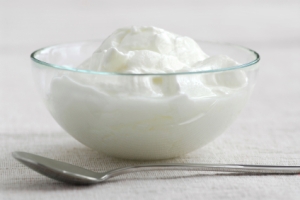 The World Health Organization defines probiotics as: “Live microorganisms which when administered in adequate amounts confer a health benefit on the host”. So, to paraphrase…good bacteria.
The World Health Organization defines probiotics as: “Live microorganisms which when administered in adequate amounts confer a health benefit on the host”. So, to paraphrase…good bacteria.
Most of us have a sense that probiotics are a good thing. That’s what TV commercials and food packages tell us, anyway. And why would they lie? But…what are these mysterious health benefits exactly? Why should we bother with probiotics?
1.To prevent yeast infections.
Not many women get away with never experiencing the joys of a vaginal yeast infection. If you’re one of the lucky ones who gets them on a regular basis, probiotics are a must for your arsenal.
2.To help with IBS symptoms.
For those of you plagued by irritable bowel syndrome (and the uber-frustration at the variability of your symptoms, the endless search for just the right thing to help, etcetera…) taking daily probiotics might help you. Not a magic bullet (I don’t believe there is a magic bullet for IBS, unfortunately), but nonetheless worth a try.
3.To prevent diarrhea caused by antibiotics.
Sometimes antibiotics are needed. Which is a good thing. Ever since 1928 when Alexander discovered penicillin in the form of bread mould (yes, people, antibiotics were originally a “natural” treatment!) a whole lot fewer people have been dying from bacterial infections. Still, the GI upset that antibiotics can cause (plus yeast infections…and here, kindly refer to point #1) is no picnic. Antibiotics do tend to upset the natural balance in your system and wipe out your resident “good” bacteria in addition to the bad guys. I have been told by some German patients of mine that it’s standard practice in Germany to prescribe probiotics alongside antibiotics, and I think that’s perhaps not a bad idea.
4.To prevent colds and the flu.
This is a benefit that is not firmly established yet. There needs to be more research, but some early studies have shown promising results. Children in daycare who were given daily probiotic supplements had fewer fevers, coughing episodes, and nasal congestion.
So how do you get probiotics? Yogurt is the most common source but you can also find probiotics in other fermented foods like kefir, sauerkraut, and tempeh.
Then there are supplements, of course. But to be honest that’s not something I bother with. I eat plain yogurt on a daily basis, pretty much, because I love it. And if you think it’s weird to eat yogurt daily, pick up a copy of French Women Don’t Get Fat (Mireille, my French idol, advocates making your own yogurt from scratch).
Or think: Mediterranean Diet. Greek yogurt is the bomb. Have you ever tried it with a handful of walnuts and a little drizzle of honey? The. Best.
But if you can’t tolerate dairy, or simply don’t like yogurt, given all the potential benefits of probiotics, supplements are probably a good idea.






